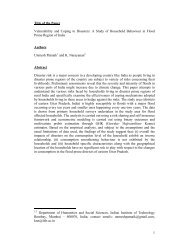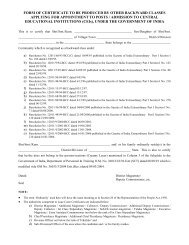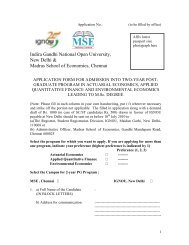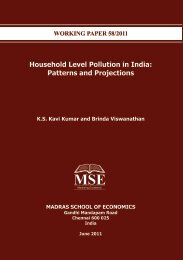Accounting for India's Forest Wealth - Madras School of Economics
Accounting for India's Forest Wealth - Madras School of Economics
Accounting for India's Forest Wealth - Madras School of Economics
- No tags were found...
Create successful ePaper yourself
Turn your PDF publications into a flip-book with our unique Google optimized e-Paper software.
State Finance Ministers, The Task Force <strong>of</strong> Thirteenth FinanceCommission and the model GST recommended by the Thirteenth FinanceCommission, in all cases there is a clear recognition <strong>of</strong> the need <strong>for</strong>environmental taxes, an reference has been made to demerit goods/singoods/environment (polluting) goods.The Thirteenth Finance Commission has made reference to three<strong>for</strong>ms <strong>of</strong> environmental taxes” Non-rebatable excise duties, cesses, anduser charges. These three <strong>for</strong>ms <strong>of</strong> environmental taxes can be used toserve different purposes. Non-rebatable excises add to overall GST level,and this should be used to at least partially reduce the core GST rate.Cesses should be earmarked <strong>for</strong> environment promoting activities inindustries to cover cost <strong>of</strong> specific publically provided environmentalservices were beneficiaries are identifiable..REFERENCESBallard, C. L and S.G. Medema (1992), The Marginal Efficiency Effects <strong>of</strong>Taxes and Subsidies in the Present <strong>of</strong> Externalities: AComputational General Equilibrium Approach, East Lansing MI,Michigan State University.Ballard, C.L. and Don Fullerton (1992),.Distortionary taxation and theprovision <strong>of</strong> public goods. Journal <strong>of</strong> Economic Perspectives,6:117–131,Baumol, W.J and Oates, W.E (1988), The Theory <strong>of</strong> Environmental Policy,(2nd Edition), Cambridge, Cambridge University Press.Bovenberg, A. Lans and Lawrence H. Goulder (1996), “OptimalEnvironmental Taxation in the Presence <strong>of</strong> Other Taxes: General-Equilibrium Analyses”, The American Economic Review, Vo. 86(4), September, 985-1000.Bovenberg, A. Lans and Ruud A. de Mooij (1994), “Environmental Leviesand Distortionary Taxation”, American Economic Review, 84,1085-9.38


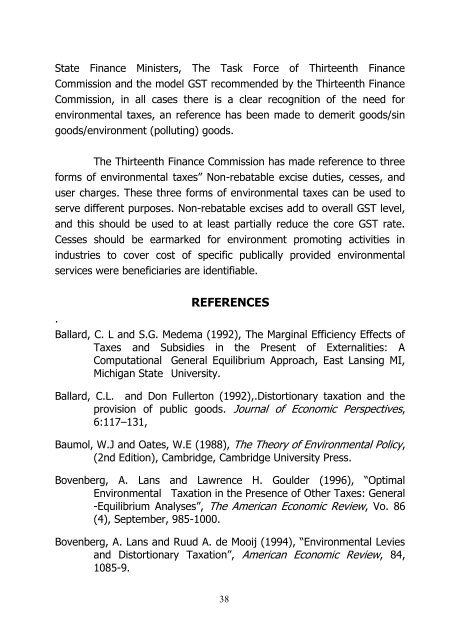
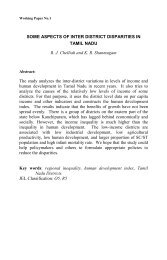
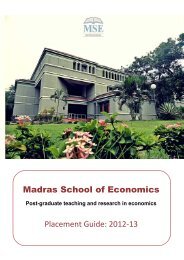
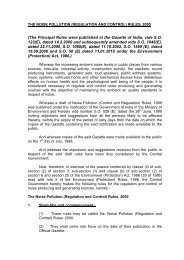
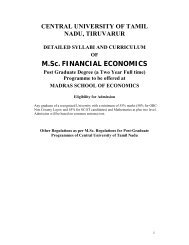
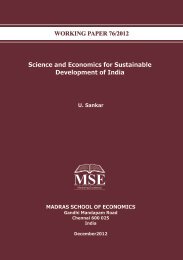
![Curriculum Vitae [pdf] - Madras School of Economics](https://img.yumpu.com/49878970/1/190x245/curriculum-vitae-pdf-madras-school-of-economics.jpg?quality=85)
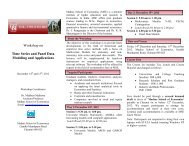
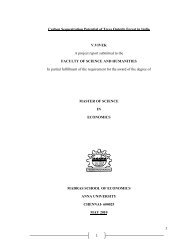
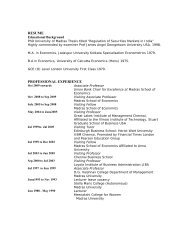
![Curriculum Vitae [pdf] - Madras School of Economics](https://img.yumpu.com/48715201/1/184x260/curriculum-vitae-pdf-madras-school-of-economics.jpg?quality=85)
